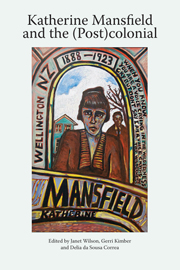Book contents
- Frontmatter
- Contents
- List of Illustrations
- Acknowledgements
- Colophon
- Introduction
- Criticism
- Katherine Mansfield: Cannibal
- Mansfield as (Post) colonial-Modernist: Rewriting the Contract with Death
- Colonialism and the Need for Impurity: Katherine Mansfield, ‘The Garden Party’ and Postcolonial Feeling
- ‘How Katherine Mansfield was Kidnapped’: A (Post) colonial Family Romance
- ‘Unmasking’ the First-Person Narrator of In a German Pension
- Workmanship and Wildness: Katherine Mansfield on Edith Wharton's The Age of Innocence
- Home and Abroad in the South Pacific: Spaces and Places in Robert Louis Stevenson and Katherine Mansfield's Short Fiction
- Literatures of Expatriation and the Colonial Mansfield
- Creative Writing
- Reports
- Reviews
- Notes on Contributors
- Katherine Mansfield Society
Colonialism and the Need for Impurity: Katherine Mansfield, ‘The Garden Party’ and Postcolonial Feeling
from Criticism
Published online by Cambridge University Press: 05 March 2014
- Frontmatter
- Contents
- List of Illustrations
- Acknowledgements
- Colophon
- Introduction
- Criticism
- Katherine Mansfield: Cannibal
- Mansfield as (Post) colonial-Modernist: Rewriting the Contract with Death
- Colonialism and the Need for Impurity: Katherine Mansfield, ‘The Garden Party’ and Postcolonial Feeling
- ‘How Katherine Mansfield was Kidnapped’: A (Post) colonial Family Romance
- ‘Unmasking’ the First-Person Narrator of In a German Pension
- Workmanship and Wildness: Katherine Mansfield on Edith Wharton's The Age of Innocence
- Home and Abroad in the South Pacific: Spaces and Places in Robert Louis Stevenson and Katherine Mansfield's Short Fiction
- Literatures of Expatriation and the Colonial Mansfield
- Creative Writing
- Reports
- Reviews
- Notes on Contributors
- Katherine Mansfield Society
Summary
Does Katherine Mansfield's writing pertain to the sphere of what we today call ‘postcolonial’? And how radical and productive a notion is the postcolonial? In an important essay, Ella Shohat argues that the postcolonial is probably much less radical than is generally thought, insofar as it reproduces the colonial narrative of progress and linearity, predicated upon an ethics of chronological expansion from a ‘pre’ to a ‘post’. Even if we suppose, for the sake of the argument, that over a period of several decades we went from colonialism to anti-colonialism, and then to postcolonialism, we cannot but accept that the post-colonial, by expanding spatially, also involves micro-mechanisms of producing both colonial and anti-colonial elements. In this essay, I want to argue that the postcolonial, if examined through a number of Mansfield's journals, letters and her famous short story ‘The Garden Party’, may be seen more broadly as a spatial as well as a chronological entity, or even a frame of thinking that runs counter to the mentality and practice of the colonial, without, however, precluding or eliminating the work or influence of coloniality. The postcolonial, in that sense, does not constitute an airtight category or territory but is rather infiltrated by a fusion of colonial practices and anti-colonial techniques, thus forming something resembling Homi Bhabha's insight concerning the existence of a third space which ‘problematises the binary division of past and present, tradition and modernity, at the level of cultural representation and its authoritative address’.
- Type
- Chapter
- Information
- Katherine Mansfield and the (Post)colonial , pp. 45 - 62Publisher: Edinburgh University PressPrint publication year: 2013



